Finding the best casino sites in the UK can feel overwhelming with so many options competing for attention. Knowing which sites are safe, trusted, and worth your time is important. Making the right choice means getting access to better games, smoother payments, and a more enjoyable gaming experience.
Our team of researchers has tested hundreds of UK casino sites, and we’ve shortlisted the best ones to suit different player preferences. From top-rated game selections to generous bonus offers and strong security measures, we’ve analysed every key detail thoroughly. The result is an updated list featuring the leading gaming platforms in Great Britain.
The Best UK Casino Sites Ranked for 2025
| 🏆 Overall Best Online Casino | 888Casino |
| 🎰 Home to the Most Slots | Highbet (2,000+) |
| 💳 Top 3 Banking Methods |
|
| 📱 Best Casino for Android and iOS Apps | Parimatch (iOS and Android) |
| 🃏 Leading Blackjack Platform | Betfred |
| ⏱️ Average Payout Processing Times | 12 – 24 hours |
| 🎁 Beginner-Friendly Loyalty Programme | CasiGo |
| ♠️ Poker Cash Games and Tournaments | William Hill |
| 🖥️ Favourite Software Providers |
|
Reviews of the Best Online Casinos UK
A great online casino should offer more than just games. It should feel secure, work smoothly across devices, and make payments easy. To help you choose, here’s a closer look at the best online casino options available right now.
1. 888Casino – The Best Online Casino UK in 2025
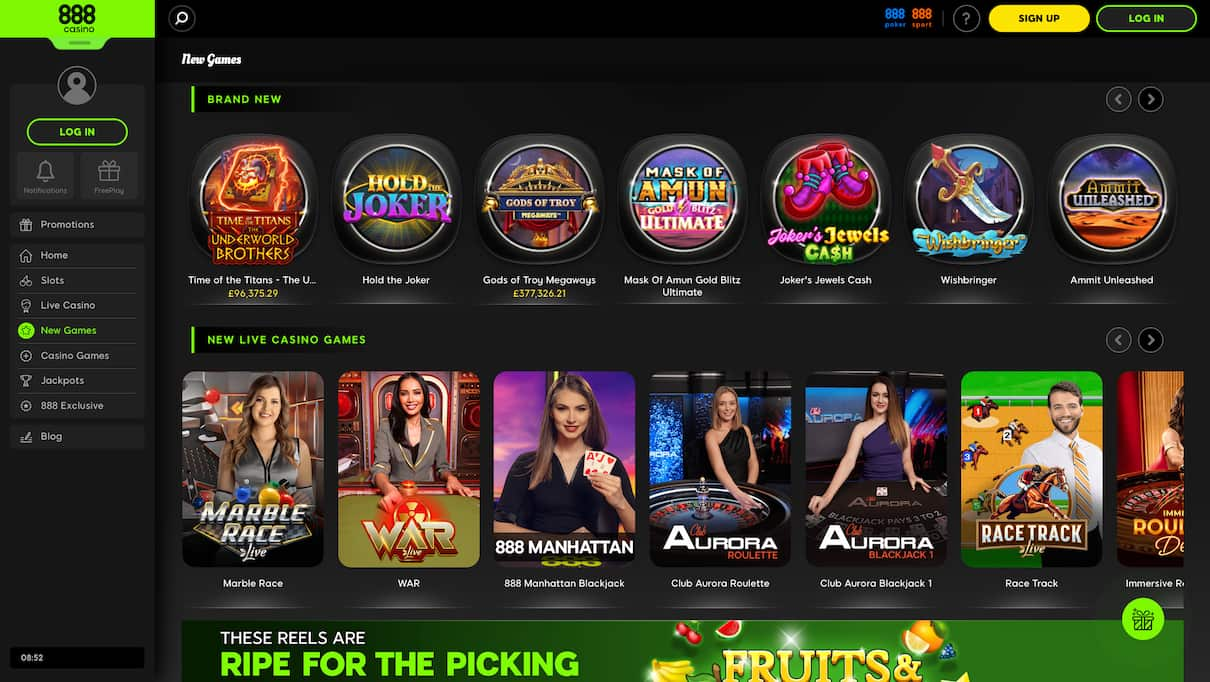
888Casino is known for its strong selection of games, offering something for every type of player across its 2,000-title library. You’ll find exclusive virtual slots and live dealer tables alongside titles from big names like Evolution, Playtech, and NetEnt. The site’s partnerships with award-winning providers help ensure a wide range of high-quality options, from themed slots to premium live blackjack rooms.
Founded in 1997, 888Casino has built a reputation as one of the most trusted UK casino sites. Unlike offshore platforms, it holds licences from both the UK Gambling Commission (UKGC) and the Gibraltar Gambling Commissioner, implementing high standards of safety and fairness. You can also access a full suite of tools, including deposit limits, reality checks, and self-exclusion, that support responsible gambling.
New and returning users can enjoy regular promotions at 888Casino, including generous welcome bonuses and fresh ongoing rewards. The platform supports a variety of payment methods, such as PayPal, Visa, Mastercard, and bank transfers, with instant deposits and quick withdrawals. What’s more, it takes a minimum £10 first deposit to become eligible for your first bonus.
888Casino Welcome Bonus
| Welcome Offer | Promo Code | Wagering Requirements | Minimum Deposit | Eligible Games |
| 200% up to £200 | Not required | 30x | £10 | Selected slots |
888Casino Pros and Cons
✅ Pros:
- Includes online sports betting and poker
- Available on iOS and Android devices
- £10 fee-free minimum deposit limit
- Exclusive 888 Speed Auto Roulette
❌ Cons:
- Welcome bonus is limited to eligible slots
- Payouts can take up to 5 business days
2. William Hill – Trusted Gambling Site Offering Games, Poker, and Sports Betting
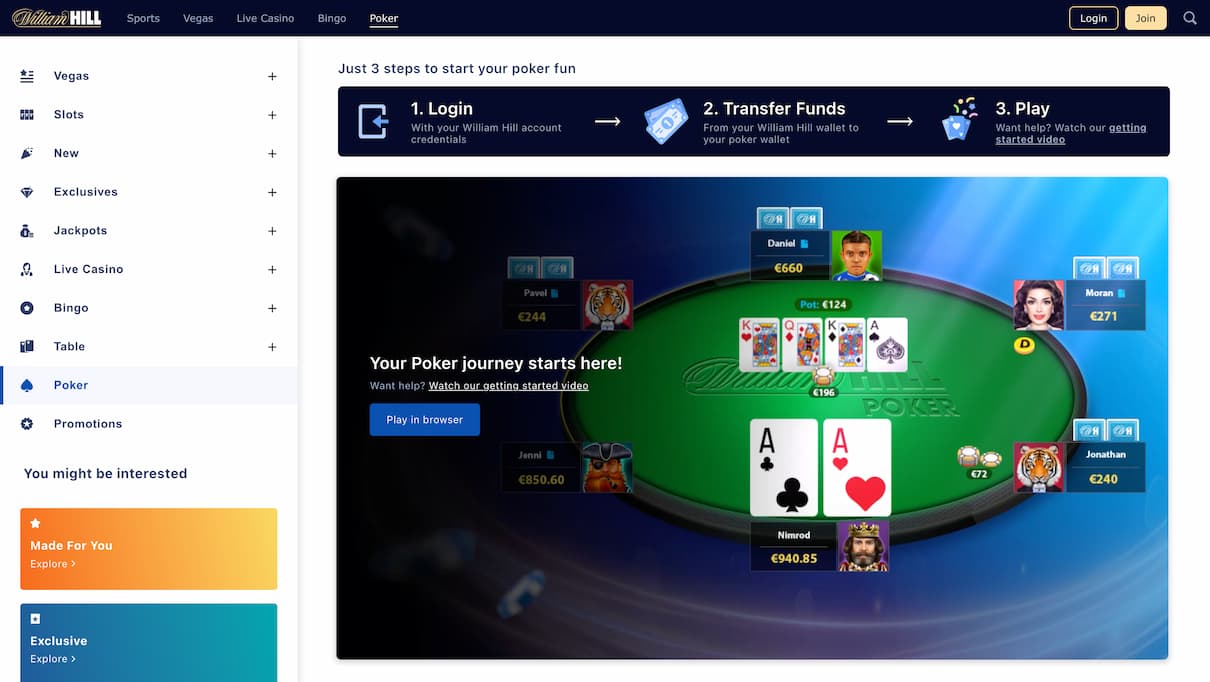
William Hill Casino offers much more than just slots and table games. You can explore a full bingo section, a dedicated poker platform, and one of the most respected sports betting services in the UK. So whether you’re looking for spinning reels, real-money tournaments, or bets on an upcoming match, the site brings everything together under one trusted brand.
Funding your William Hill Casino account is convenient and secure, with support for debit cards, Skrill, PayPal, and other popular methods. Debit card deposits and withdrawals carry a minimum limit of £5, with fast transfers and no fees. If you prefer eWallets, deposits usually have a £10 minimum, while withdrawals range between £5 and £10, depending on the service.
At William Hill Casino, you’ll also find regular promotions tailored to different parts of the site, including live dealer games, bingo rooms, and poker tournaments. Every offer comes with fair terms, making it easier to enjoy the rewards without worrying about hidden conditions. In addition, there’s a loyalty programme designed to reward active players with exclusive bonuses.
William Hill Welcome Bonus
| Welcome Offer | Promo Code | Wagering Requirements | Minimum Deposit | Eligible Games |
| 200 free spins with your first deposit | BBS200 | 1x | £10 | Big Bass Splash |
William Hill Pros and Cons
✅ Pros:
- Poker cash games and tournaments
- Popular promotions, including free spins
- £5 minimum deposits with debit cards
- A trusted and regulated top online casino
❌ Cons:
- The website could use an design uplift
- No matched bonus for new UK players
3. CasiGo – Features Casino Games by 80+ Licensed Software Providers
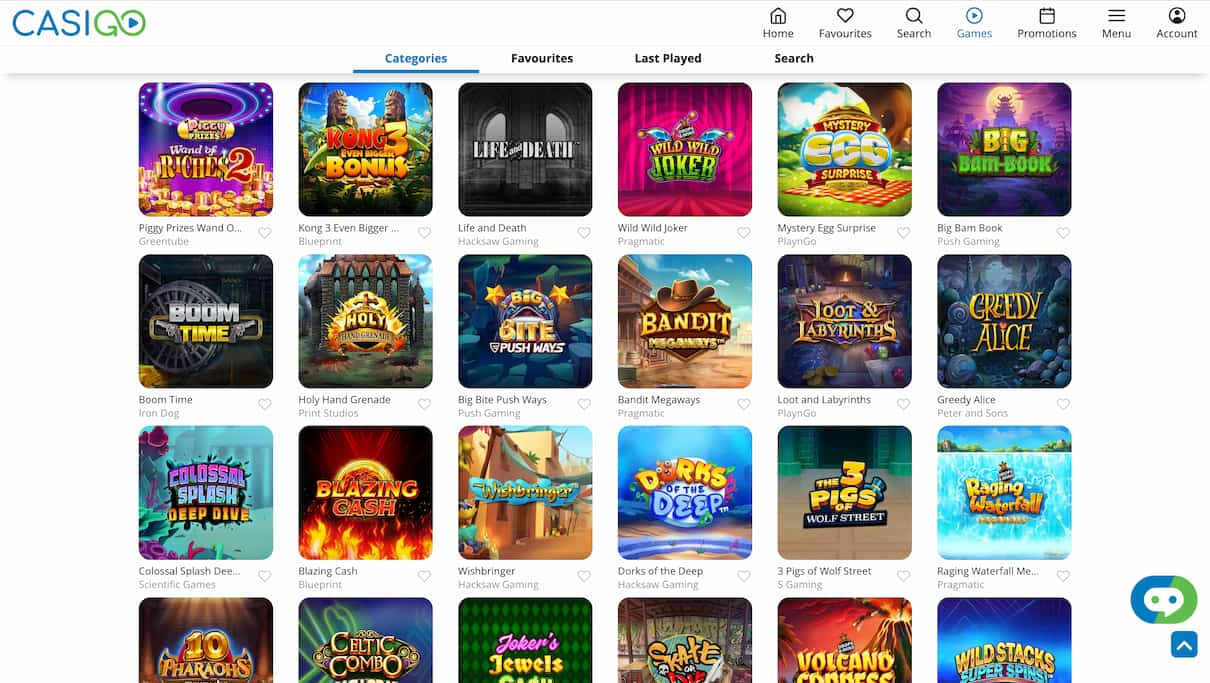
CasiGo offers an impressive game library with over 2,000 titles from more than 80 software providers. You’ll find a mix of popular names like NetEnt and Microgaming alongside Jelly Games and other niche developers, giving you a huge variety of gaming options. Moreover, most games allow minimum bets between 10p and £1, making them accessible to most bankrolls.
The promotions at CasiGo are a major attraction for players in the UK, starting with a five-part welcome package with up to 825 free spins on Book of Dead. Daily deals are also available, with Fiesta Fridays offering matched deposit bonuses and Treasure Tuesdays unlocking a maximum of 100 free spins. What’s more, every wager counts towards loyalty points, which you can exchange for personalised rewards.
CasiGo Casino accepts Visa, MasterCard, Skrill, Neteller, and PayPal, offering quick and secure transactions. As one of the best casino sites, it holds licenses from the UKGC and the Malta Gaming Authority (MGA), both respected names in online regulation. In addition, it implements strong encryption technology and strict privacy policies to help guarantee a secure and trusted gaming environment.
CasiGo Welcome Bonus
| Welcome Offer | Promo Code | Wagering Requirements | Minimum Deposit | Eligible Games |
| Up to 825 bonus spins | Not required | 35x | £20 | Book of Dead |
CasiGo Pros and Cons
✅ Pros:
- Up to 825 free spins with new accounts
- 2,000+ games from 80+ software providers
- User-friendly and responsive website
- Daily promotions, including matched offers
❌ Cons:
- No downloadable casino app
- Relatively high wagering on free spins
4. Highbet – Best Casino Site for Player Safety and Security
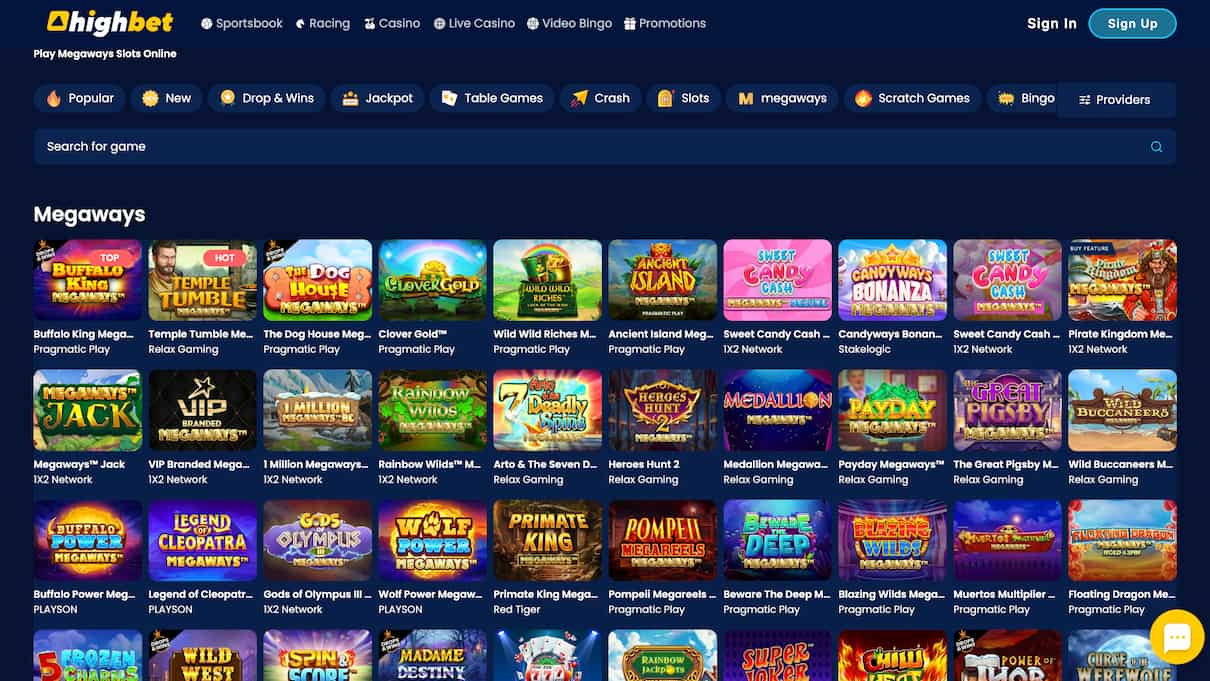
Highbet places a strong focus on security, giving you peace of mind when signing up and playing. The platform is fully licensed by the UKGC and the MGA, guaranteeing game fairness and player safety. Moreover, your data stays protected through advanced SSL encryption and regular third-party audits, helping to prevent fraud and unauthorised access.
The game library at HighBet Casino covers a wide range of favourites, from over 2,000 virtual games to a growing collection of jackpot slots. You’ll also find 150+ live dealer tables powered by Pragmatic Play and other top studios, along with a variety of video bingo games. The site also hosts a dedicated online sportsbook with competitive odds and various promotions and ranks as one of the best non-Gamstop betting sites.
Highbet works seamlessly on mobile, offering fast loading times and full functionality across iOS and Android devices. In addition to playing from anywhere, you can use your smartphone or tablet to fund your account using Visa, MasterCard, Skrill, Neteller, and Trustly, with deposits starting from £10. Withdrawals, meanwhile, are typically processed within one to three business days, depending on your chosen payment method.
Highbet Welcome Bonus
| Welcome Offer | Promo Code | Wagering Requirements | Minimum Deposit | Eligible Games |
| £2,000,000 monthly prize pool | Not required | 0x | N/A | Listed games by Pragmatic Play |
Highbet Pros and Cons
✅ Pros:
- Licensed by top-tier iGaming regulators
- Instant deposits and fast payouts with eWallets
- 24/7 customer care via live chat and email
- 150+ live tables and game shows
❌ Cons:
- Most offers cater to sports betting
- Doesn’t accept deposits of £5
5. BoyleSports – Established Platform Partnered with World-Class Providers
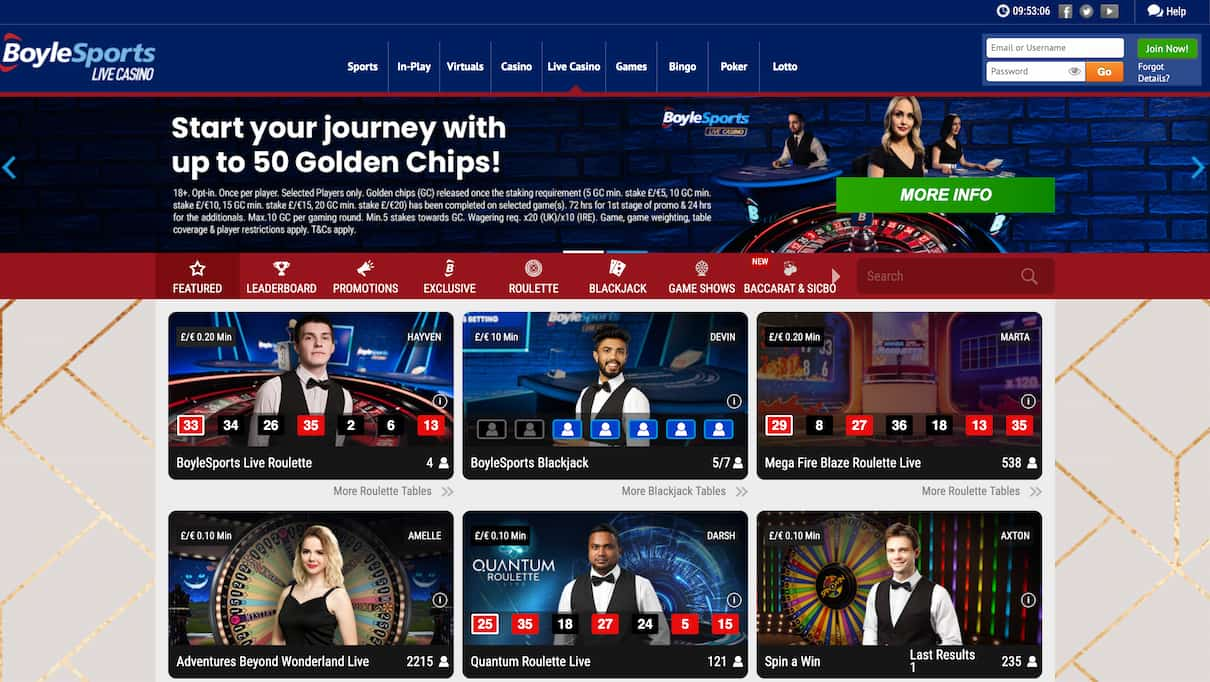
Established in 1982, BoyleSports is a well-known name in the gambling industry, especially in Ireland and the UK. The site operates under a UKGC license and supports responsible gambling through a range of user-friendly tools. In addition, regular audits are carried out on the site to ensure games are fair and accounts are duly protected from potential cyberattacks.
BoyleSports Casino has partnered with Playtech to deliver a wide collection of slots and live dealer games. On this casino online, you’ll find exclusive table games, variants like Quantum Roulette, and hundreds of slots with varying RTPs and potential payouts. Moreover, thanks to its partnership with Blueprint Gaming, you can also access Jackpot King progressive prizes while playing participating games.
The BoyleSports platform works smoothly across mobile devices, with dedicated apps available for both Android and iOS users. Several payment methods, including Paysafecard, PayPal, and Visa, are fully mobile-friendly, helping you manage deposits and withdrawals from anywhere. Minimum deposit and withdrawal limits are set at £10, and no transaction fees are charged by the operator.
BoyleSports Welcome Bonus
| Welcome Offer | Promo Code | Wagering Requirements | Minimum Deposit | Eligible Games |
| Up to 100 free spins | Not required | 1x | £20 – £100 | Big Bass Bonanza, Book of the Fallen, or Snakes and Ladders Megadice |
BoyleSports Pros and Cons
✅ Pros:
- Low wagering on free spins welcome bonus
- Progressive jackpots by Jackpot King
- Downloadable apps for iPhone and Android devices
- Convenient ways to activate safer gambling tools
❌ Cons:
- Few details on ongoing promotions available
- Account verification can be slow during busier periods
6. Parimatch – Mobile Gameplay with Downloadable Casino Apps
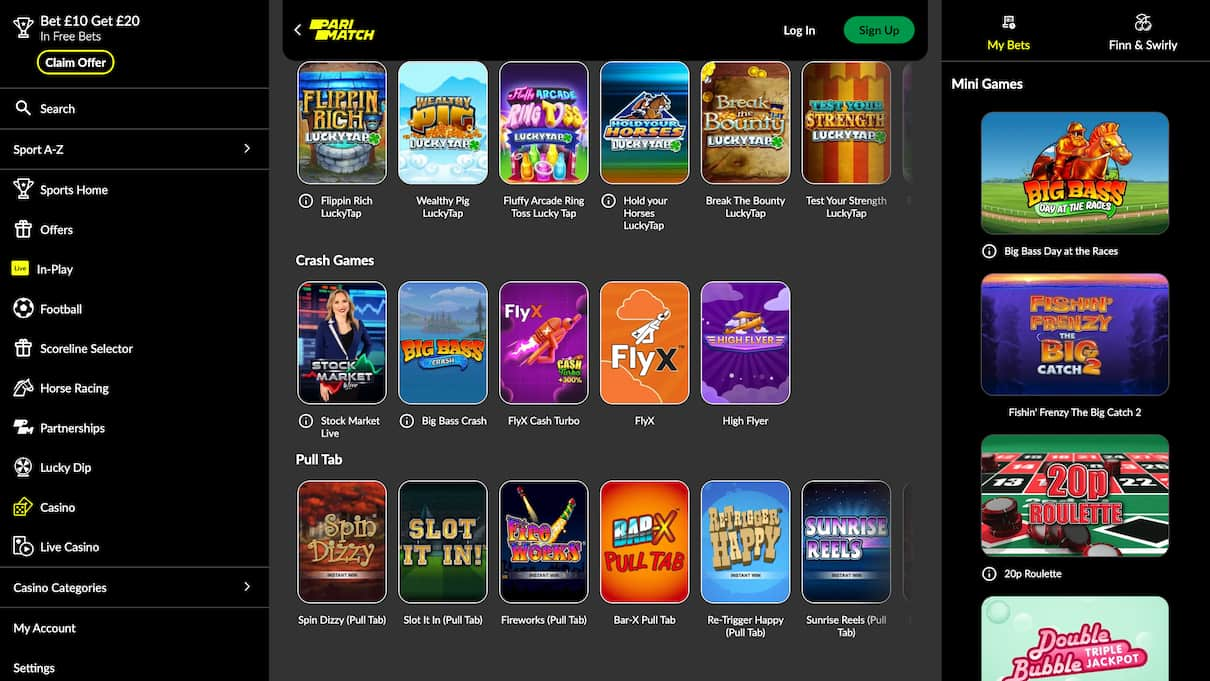
Parimatch is one of the best casino sites for the high proportion of UK gamblers that prefer playing and betting on mobile devices. No matter whether you access the platform through its responsive website or by downloading its iOS and Android mobile apps, you can expect smooth navigation, fast loading times, and full-feature access on smaller screens.
The casino library at Parimatch has over 2,000 titles, including a small but popular collection of arcade-style titles like Big Bass Crash and FlyX. These games are loved for their fast-paced action, interactive gameplay, and high RTPs. Alongside arcade options, you’ll find a strong collection of slots, table games, and live game shows.
By joining Parimatch from the United Kingdom, you can choose between casino and live casino welcome offers. Slot fans will appreciate a bonus of up to £45, which can be used on Big Bass Bonanza, along with 60 free spins on eligible slots. If you prefer live games, you can claim 20 golden chips to spend on Adventure Beyond Wonderland Live, along with a cash bonus of up to £40.
Parimatch Welcome Bonus
| Welcome Offer | Promo Code | Wagering Requirements | Minimum Deposit | Eligible Games |
| Up to £45 in bonuses + 60 free spins | Not required | 30x | £10 | Select slot games |
| Up to £40 in bonuses + 20 golden chips | Not required | 40x | £15 | Select live games |
Parimatch Pros and Cons
✅ Pros:
- Casino apps for Android and iOS
- Multiple first deposit bonus offers
- Crash games with 10p minimum bets
- Minimum deposit limits of between £5 and £10
❌ Cons:
- Limited details about existing player promotions
- No slots by RealTime Gaming or Betsoft
7. SpinYoo Casino – New Online Casino with Real Money and Fast Payouts
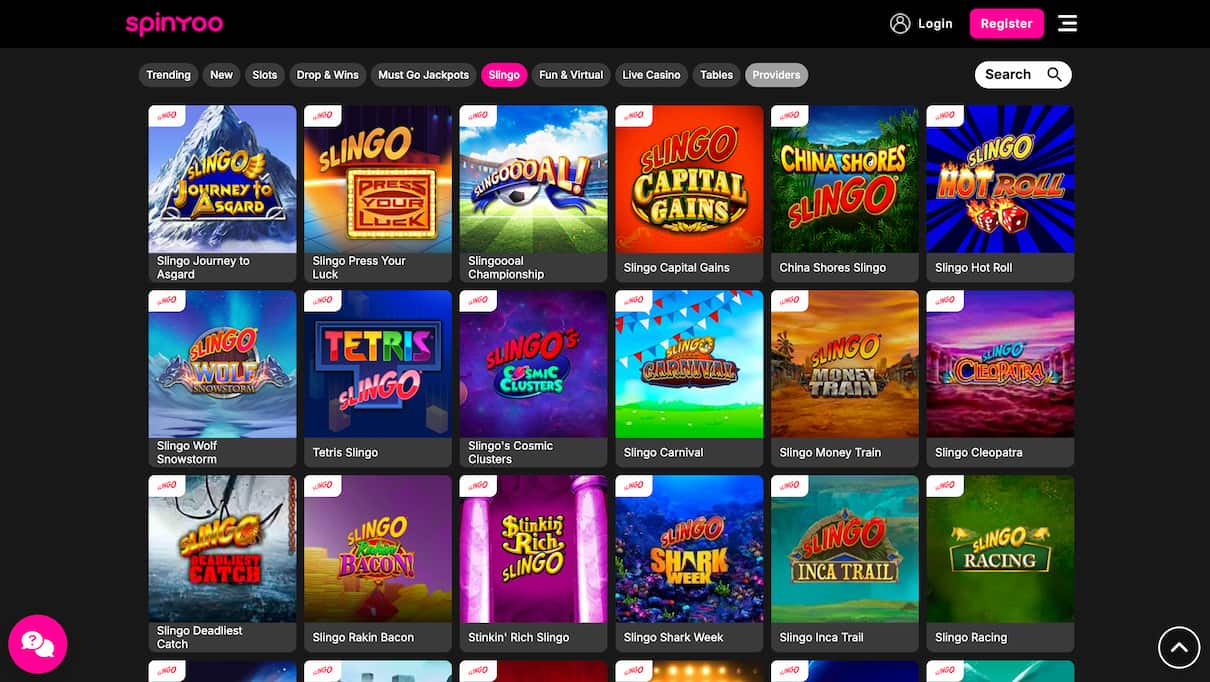
SpinYoo Casino launched in 2021 and quickly earned a solid reputation among UK players, becoming one of the best new online casinos. While it’s relatively young, it still operates under a license from the UKGC, ensuring strict safety and fairness standards. In addition, it implements strong encryption technology and responsible gambling tools, making it a secure and trustworthy place to play.
The site supports a range of banking options, including Visa, Mastercard, Apple Pay, and bank transfers. Like many of the best casino sites, deposits and withdrawals are subject to a minimum limit of £10. Moreover, deposits are processed instantly, and most payout requests from verified accounts are approved within 12 hours, making SpinYoo one of the fastest payout casinos in the UK.
SpinYoo offers a large collection of slots, table games, and live dealer titles from top providers. It also offers plenty of Slingo games that combine reel spinning with bingo marking. Promotions include matched bonuses and free spins, plus the Yoo Loyalty Points Rewards system, which lets you earn points on every deposit.
SpinYoo Welcome Bonus
| Welcome Offer | Promo Code | Wagering Requirements | Minimum Deposit | Eligible Games |
| 100% up to £250 + 100 free spins | Not required | 35x | £20 | Select slot games |
SpinYoo Pros and Cons
✅ Pros:
- Withdrawal approvals within 12 hours
- Weekly promotion for live casino games
- Latest games by Slingo Originals
- £10 minimum payment limits
❌ Cons:
- £40 stake on video poker to get 1 point
- No downloadable casino apps
8. Betfred – 50+ Virtual and Live Blackjack Tables with Exclusive Titles

Betfred Casino offers 2,700+ games, with a focus on virtual and live blackjack tables. Once you’ve signed up, you can sit at exclusive tables, such as Betfred All Bets Blackjack Live, along with Playtech favourites like Mega Fire Blaze Blackjack Live.
This best online casino rewards loyalty through its comp points system, where you earn points for every cash bet placed. You can later convert these points into bonus funds to use across the casino. Betfred also runs frequent promotions, including a live casino deal that gives you £5 in golden chips when you meet the qualifying requirements.
With a history dating back to 1967, Betfred has built a strong reputation in the UK gaming scene. Like other featured online casinos, it holds a license from the UKGC and sponsors several local sports teams and events. This trusted status made it among the first operators to offer instant bank transfers with most major local banks, including HSBC and Barclays.
Betfred Welcome Bonus
| Welcome Offer | Promo Code | Wagering Requirements | Minimum Deposit | Eligible Games |
| Up to 200 free spins | Not required | 1x | £10 | Age of the Gods, Better Wilds, and Age of the Gods: God of Storms 2 |
| Up to £5 in golden chips | Not required | 1x | £10 | Eligible live games |
Betfred Pros and Cons
✅ Pros:
- Instant payments via bank transfers
- A trusted UK brand since 1967
- Choice of welcome offers
- Includes bingo and online poker rooms
❌ Cons:
- Small live casino welcome bonus
- Payouts take a minimum of 48 hours
9. Virgin Bet – Beginner-Friendly UK Casino with a £5 Minimum Deposit Limit
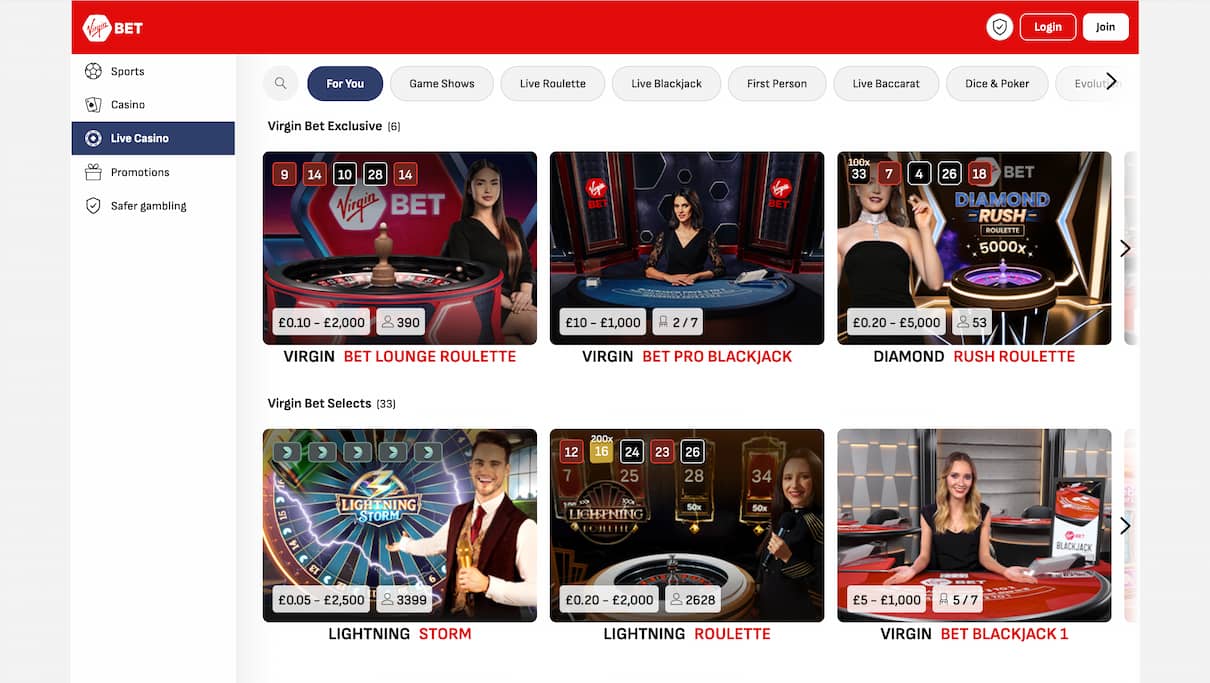
Virgin Bet Casino offers flexible banking options, making it a good choice whether you’re a new or seasoned player. You can deposit as little as £5 with a debit card, which is ideal if you want to start small. For bigger budgets, maximum deposits reach £20,000, and payments are supported through trusted methods like Visa, Mastercard, PayPal, and Apple Pay.
The gaming library is packed with popular game categories, including a strong collection of Megaways slots, Slingo titles, and Drops & Wins games. Top developers like Play’n Go, Pragmatic Play, and NetEnt supply most of the content, giving you a reliable selection with plenty of innovative features.
Virgin Bet Casino runs regular promotions, such as free spins, prize drops, and daily free games, to keep things interesting. Daily Free Games let you play for bonus prizes without spending extra, while prize drops add random rewards during qualifying games. These and other promotions are regularly updated, and T&Cs are normally fair and reasonable.
Virgin Bet Welcome Bonus
| Welcome Offer | Promo Code | Wagering Requirements | Minimum Deposit | Eligible Games |
| 10 free spins daily | Not required | 1x | £10 | Gold Blitz |
Virgin Bet Pros and Cons
✅ Pros:
- No fees on deposits and withdrawals
- Cleopatra and other top online slots
- Free games available daily
- Includes a well-rounded sportsbook
❌ Cons:
- Missing a dedicated casino welcome offer
- Doesn’t take Skrill or Neteller
10. Sky Bet – Home to the Sky Bet Club Offering Weekly Rewards
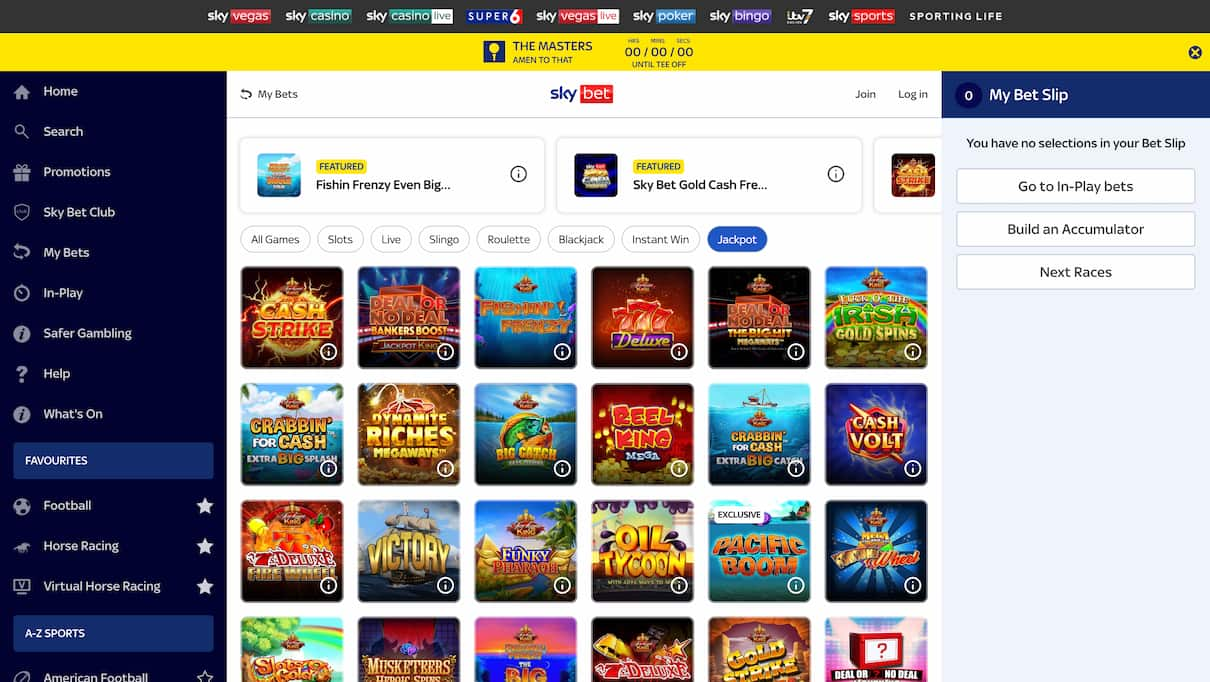
Sky Bet is home to the popular Sky Bet Club, a loyalty programme that rewards regular users each week. To start getting rewarded, you simply need to sign up and bet £30 in a week, unlocking exclusive offers and extra loyalty perks. Thousands of customers benefit from this club, alongside access to regular promotions like free bets usable across the sportsbook.
This online casino offers over 700 games, including exclusive slots and immersive live dealer tables. While the collection is not as large as that found on other online casinos for real money, you will still find a comprehensive variety of themes, RTPs, potential payouts, and bonus features.
Sky Bet puts a strong emphasis on responsible gambling, offering a full suite of player protection tools. Deposit limits, reality checks, and self-exclusion are easily accessible through your account, and customer care is available if you have any questions. Moreover, with licences from the UKGC, the operator is committed to providing a secure and fair environment for all users.
Sky Bet Welcome Bonus
| Welcome Offer | Promo Code | Wagering Requirements | Minimum Deposit | Eligible Games |
| Up to 50 free spins | Not required | 1x | £10 | Fishin’ Frenzy Even Bigger Fish, Luck O’ The Irish Fortune Play, and Deal or No Deal Bankers Boost Jackpot King |
Sky Bet Pros and Cons
✅ Pros:
- New casino games added weekly
- Offers one of the best UK sportsbooks
- Secure payments with debit cards
- User-friendly website navigation
❌ Cons:
- No matched bonus for new casino players
- Less than 1,000 games available
How to Find the Best Online Casinos
There are hundreds of UK online casinos, but only a handful of top sites. To help you identify these and avoid lower-quality platforms, you should carry out a few key and simple checks.
1. Check for Proper LicensingAlways make sure the casino holds a licence from the UKGC, the country’s only online gambling site regulator. In addition to being a legal requirement, a license proves that the site meets strict standards for fairness, security, and responsible gambling. |
2. Look for a Wide Game SelectionThe best casino sites offer hundreds or even thousands of games. Look for a mix of slots, live dealer tables, jackpots, and even bingo or arcade games. You should also check betting limits to see that they are suitable for your bankroll. |
3. Review Payment OptionsThe best UK casino sites support debit cards, eWallets, and other trusted services. They partner with Visa, PayPal, Trustly, and other providers to offer a comprehensive choice, as well as offer wide payment limits and no or low transaction fees. |
4. Compare Bonuses & PromotionsWelcome bonuses are just the start of your online casino adventure. The best sites that UK players trust will also offer ongoing free spins, loyalty rewards, and regular promotions. Remember to check the T&Cs and stay away from unreasonable rules. |
5. Test Mobile CompatibilityWhether through an app or a mobile browser, a casino should work smoothly on your phone or tablet. You should be able to play games, contact customer support and make payments without using a desktop computer. Fast loading times and easy navigation are also essential for a good mobile experience. |
6. Assess Customer SupportReliable customer service is a clear sign of a best casino online. Look for platforms offering live chat and email support 24/7. Test their response times and quality of support, and avoid platforms with long waiting times or unprofessional agents. It’s also worth checking the website for detailed FAQs. |
Games Available at UK Casino Sites
The most successful casinos online offer a wide game selection to suit different playing styles. Whether you enjoy spinning reels, facing off against a live dealer, or trying something new like Slingo, you’ll find gambling options that match your preferences.
Online Slots
Slots are easy-to-play games where you spin reels to match symbols across paylines. They come in many forms, from simple three-reel classics to feature-packed Megaways games offering thousands of ways to win.
- Classic Slots: Simple layouts, commonly featuring three reels, with fewer paylines and nostalgic symbols like fruits and bars.
- Megaways Slots: Modern games that offer dynamic ways to win on every spin, resulting in thousands of potential winning combinations and cascading symbols.
- Jackpot Slots: Games with significant prize pools that can sometimes grow with each wager, potentially resulting in million-pound drops.
| Our Slot Picks |
|
| Popular Slot Software Providers |
|
| Average Slot RTPs | 95% – 97% |
👉 Slots games are best if you want fast, varied gameplay based entirely on chance with plenty of bonus features.
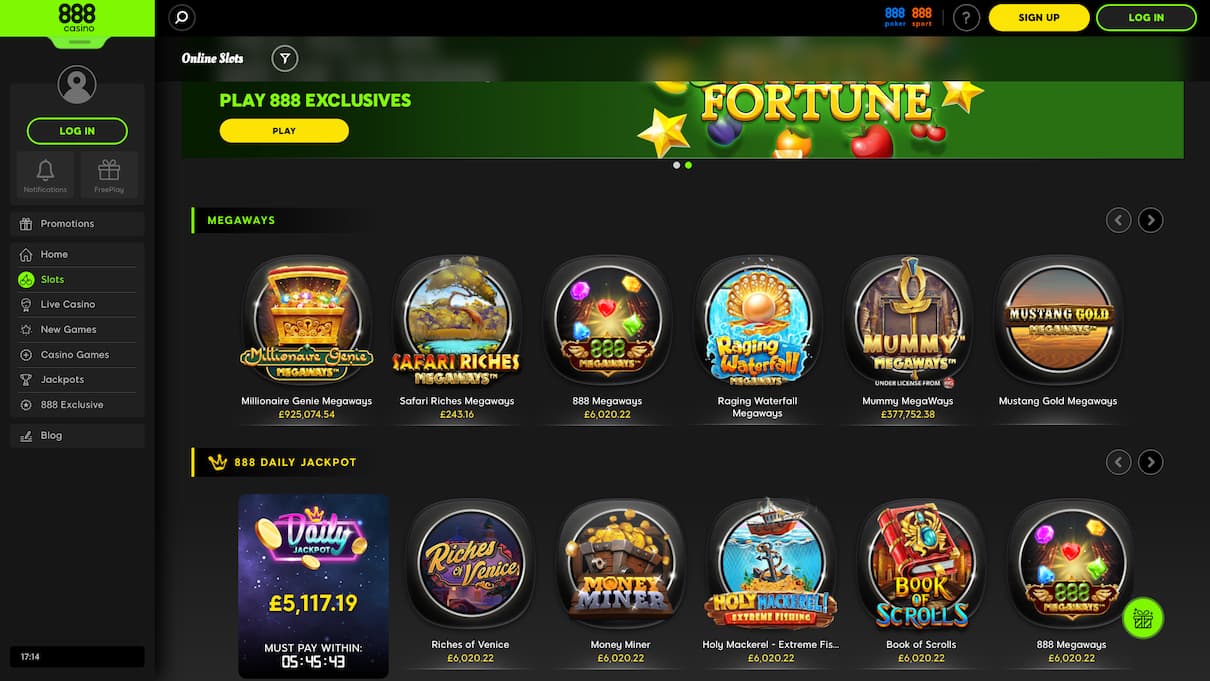
Table Games
Table games at online casinos use Random Number Generators (RNGs) to ensure fair and unpredictable results. As a result, every card dealt, roulette spin, or dice roll is powered by certified technology, giving you the same chance of winning as in a real casino.
- Blackjack: Aim to beat the dealer by building a hand as close to 21 as possible without going over, using skill and strategy.
- Roulette: Place bets on numbers, colours, or sections, then watch the ball spin around the wheel to see where it lands.
- Baccarat: Bet on whether the player or banker will have a hand closest to nine, or take a chance on a tie outcome.
| Our Table Game Picks |
|
| Popular Table Game Software Providers |
|
| Average Table Game RTPs | 97% – 99% |
👉 Table games are great if you prefer strategy, skill, and a classic casino experience, with the option of placing side bets.
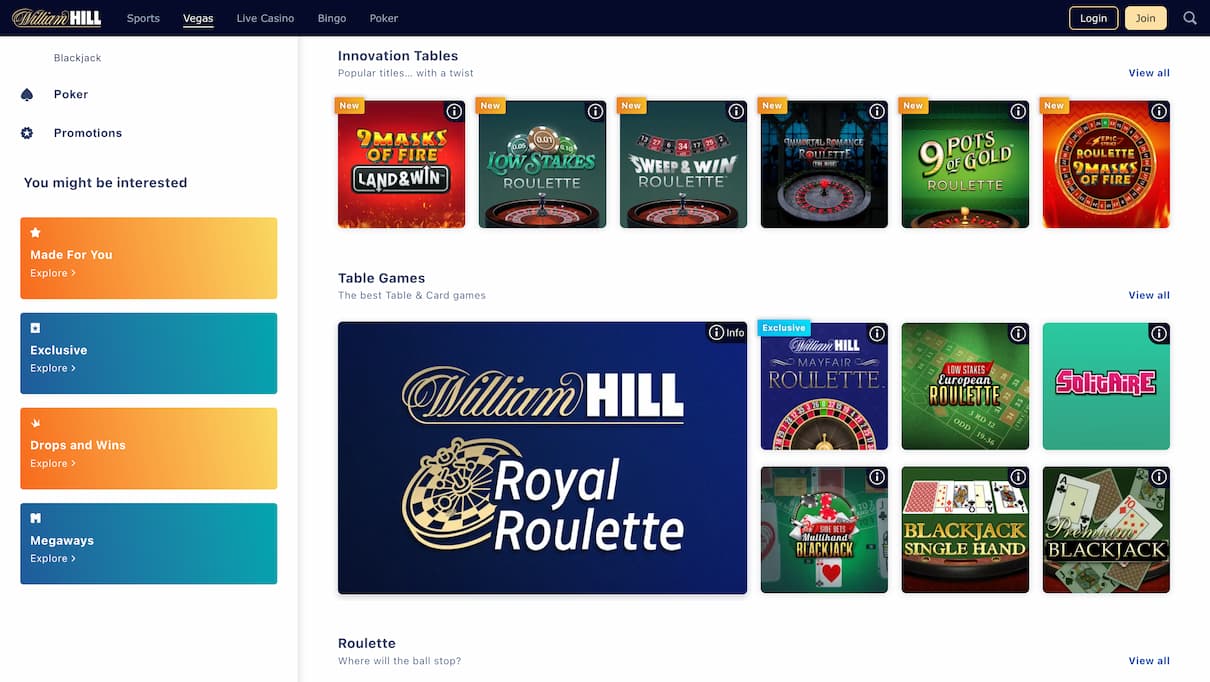
Live Casino Games
Live casino games bring the real-world casino experience to your screen by letting you play in the company of professional dealers in real time. In addition to interacting with the dealer and other players, you can enjoy classic games or unique game show-style formats.
- Live Blackjack: Play against a professional dealer, aiming to build a winning hand while exploring options like side bets and special rules.
- Live Roulette: Place your bets and watch a real wheel spin, offering a more authentic and social version of this classic game.
- Game Shows: Join in on interactive games like Crazy Time or Monopoly Live, where colourful bonus rounds and multipliers create a lively atmosphere.
| Our Live Casino Picks |
|
| Popular Live Casino Software Providers |
|
| Average Live Casino RTPs | 96% – 98% |
👉 Live casino games are ideal if you are after an immersive experience with real dealers and real-time action.
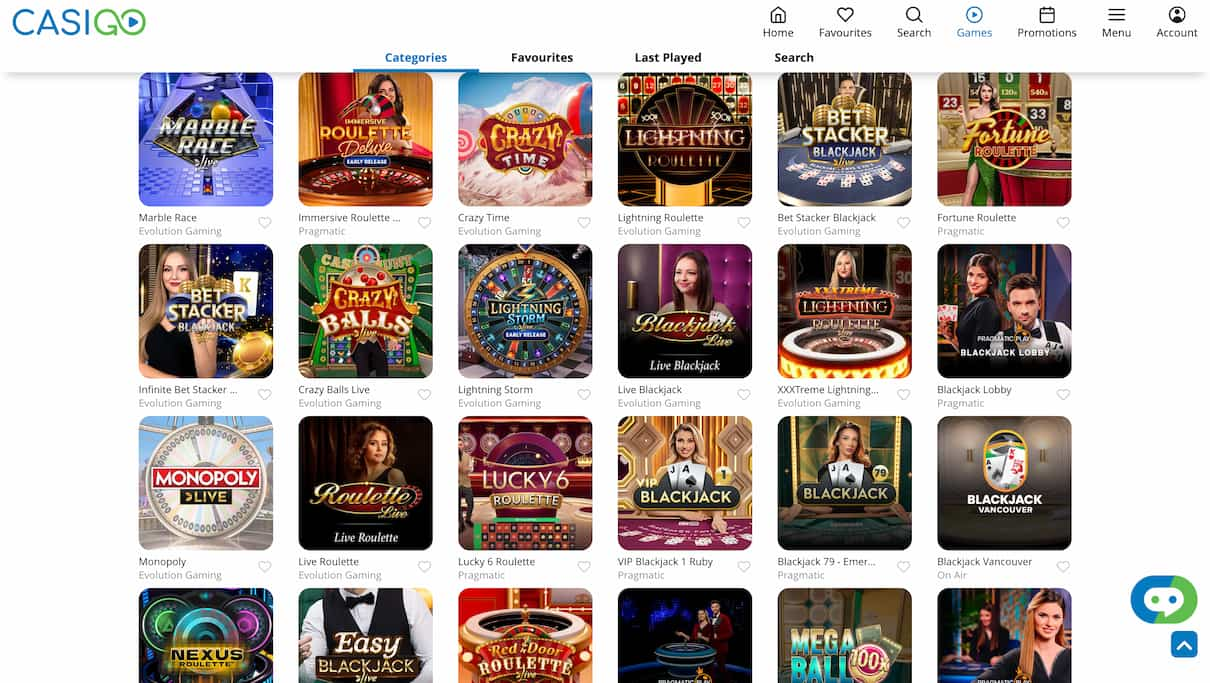
Bingo and Slingo
Bingo and Slingo are fun, fast-paced games that mix luck with simple rules, making them perfect for casual gaming. Whether you prefer traditional number draws or slot-style action on a bingo grid, both offer easy ways to play.
- 90-Ball Bingo: Mark off numbers on a three-row, nine-column ticket, aiming to complete one line, two lines, or a full house.
- 75-Ball Bingo: Complete specific patterns, such as lines or shapes, on a five-by-five grid to win instant prizes.
- Slingo Games: Spin the reels to match numbers on a bingo-style grid, completing Slingos and triggering bonus features.
| Our Bingo and Slingo Picks |
|
| Popular Bingo and Slingo Software Providers |
|
| Average Bingo and Slingo RTPs | 94% – 96% |
👉 Bingo and Slingo games are a fun choice if you enjoy light, social games with smaller bets and quick rounds.
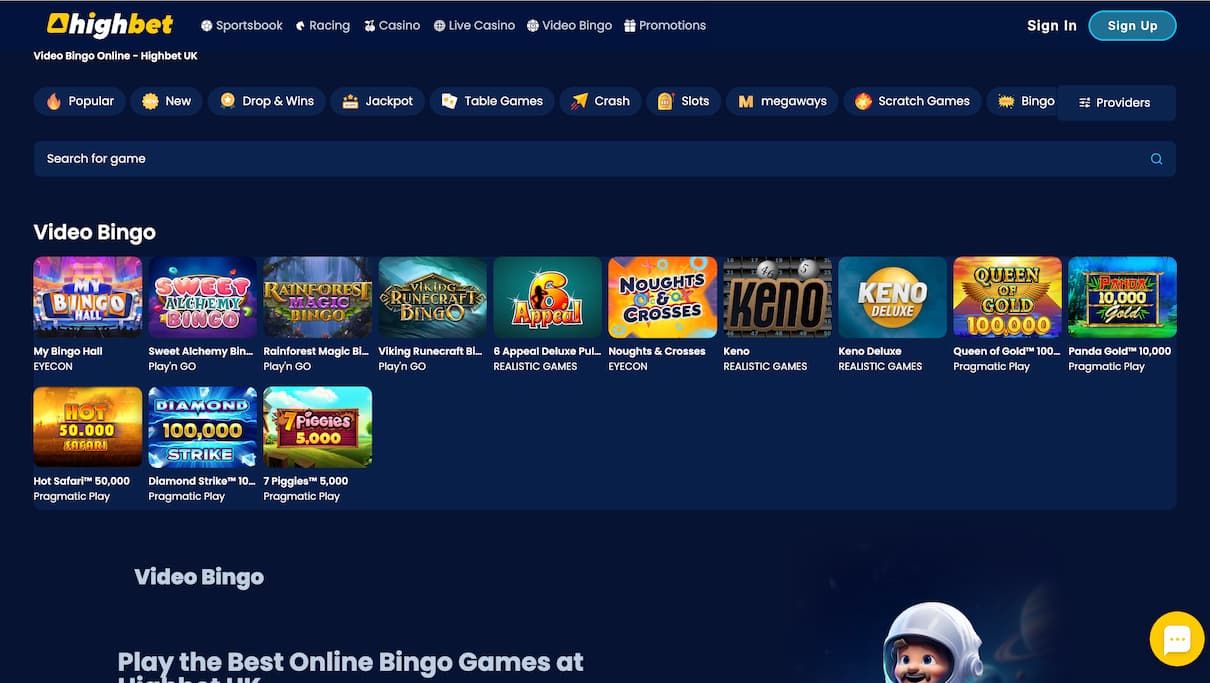
Crash and Arcade
Crash and arcade games offer fast, interactive gameplay where timing and quick decisions matter more than spinning reels. These games focus on action and simplicity, making them ideal for short, engaging gaming sessions.
- Crash Games: Place your bet and watch a multiplier rise in real time as you decide when to cash out before it crashes to lock in your winnings.
- Arcade Games: Enjoy simple, skill-based or luck-based games like flying, shooting, or climbing, often featuring instant-win formats and nostalgic designs.
- Scratchcards: Reveal hidden symbols instantly by scratching virtual cards, aiming to match patterns for a quick prize.
| Our crash and arcade Picks |
|
| Popular crash and arcade Software Providers |
|
| Average crash and arcade RTPs | 95% – 97% |
👉 Crash and arcade games are a great choice if you enjoy quick rounds, simple rules, and games that feel more interactive than traditional slots.
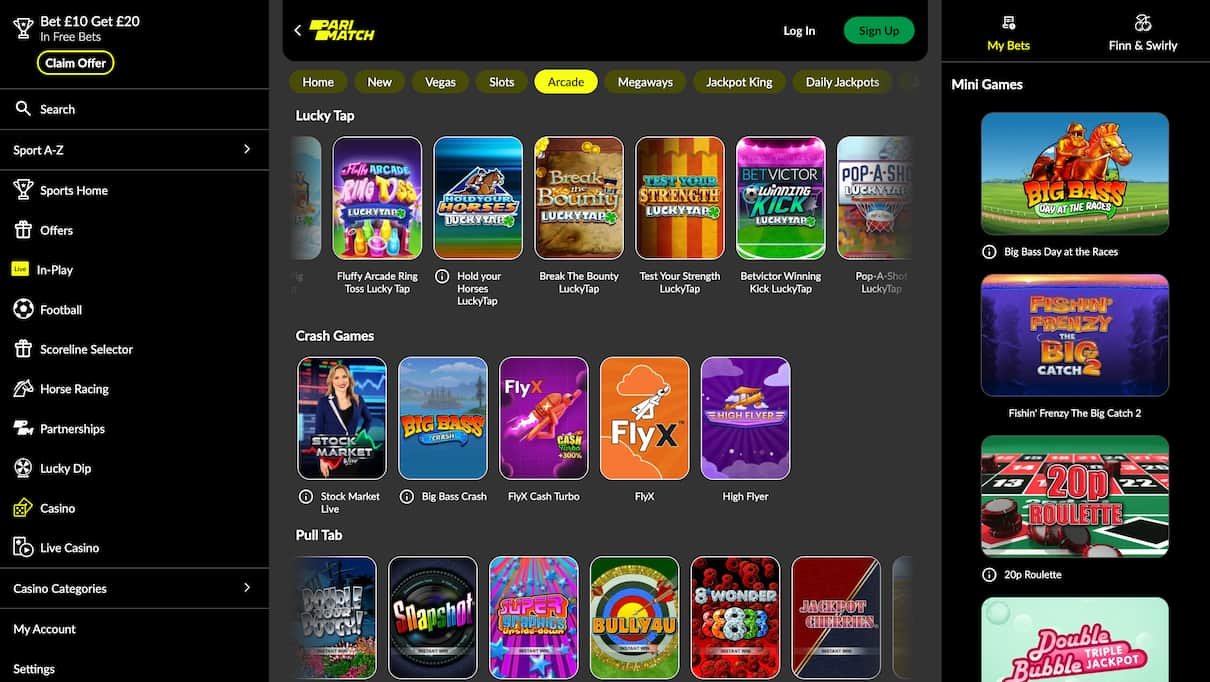
Casino Software Providers at Online Casinos
The quality of your gaming experience at the best casino sites often depends on the software powering the games. Top providers create high-quality slots, table games, and live casino experiences, making it easier for you to enjoy fair, smooth, and exciting gameplay. Here are some of the biggest names you’ll find at the platforms on our UK online casinos list.
NetEnt
🚀 Delivers innovative, visually stunning slots with a focus on high volatility and wide player appeal.
NetEnt is known for producing some of the most iconic online slots, combining innovative features with sharp graphics. The company has won awards like the EGR B2B Award for Innovation in Slot Provision and is famous for creating games that appeal to a wide audience. The brand also excels at high-volatility slots and branded titles based on pop culture.
Popular NetEnt titles include:
- Starburst
- Gonzo’s Quest
- Divine Fortune
Playtech
🚀 Offers a full suite of virtual and live casino games, excelling in branded content and progressive jackpots.
Playtech is a leading name in both virtual and live casino gaming, recognised with the Global Gaming Award for Casino Supplier of the Year. The brand specialises in branded slots, live dealer innovations, and massive jackpot networks like Jackpot Giant. It also powers exclusive live tables at many top UK casinos.
Popular Playtech titles include:
- Age of the Gods
- Buffalo Blitz
- Quantum Roulette Live
Evolution
🚀 Leads the live casino market with real-time games and interactive game shows streamed in high quality.
Evolution focuses on games with a live dealer or host and is widely seen as the gold standard for live casino experiences. They have earned multiple EGR Live Casino Supplier of the Year awards thanks to their creative game shows and smooth streaming technology. The brand excels in creating interactive, TV-style games alongside traditional live tables.
Popular Evolution titles include:
- Lightning Roulette
- Crazy Time
- Dream Catcher
Pragmatic Play
🚀 Produces a wide range of mobile-optimised slots, live games, bingo, and crash games known for speed and simplicity.
Pragmatic Play is known for its diverse portfolio, offering slots, live casino games, bingo, and crash games. The provider has picked up awards like the SBC Award for Innovation in Mobile and stands out for creating fast, mobile-friendly games. The brand’s Drops & Wins series is a major hit across many online casinos.
Popular Pragmatic Play titles include:
- Big Bass Bonanza
- Sweet Bonanza
- Spaceman
Play’n Go
🚀Specialises in mobile-first slots with strong themes, rewarding features, and smooth gameplay across all devices.
Play’n Go is famous for high-quality slots with strong storylines and bonus-packed features, winning the IGA Slot Provider of the Year award. They excel at producing mobile-first games that work seamlessly across all devices. Their portfolio covers a mix of classic fruit slots and complex multi-featured titles.
Popular Play’n Go titles include:
- Book of Dead
- Reactoonz
- Moon Princess
Bonuses & Promotions at UK Online Casino Sites
Bonuses and promotions give you extra value when you sign up or play regularly at the top online casinos. Knowing how each offer works and how to use it smartly can help you get the most from your time and money. Here’s a breakdown of the main types of bonuses you’ll find.
Welcome Bonuses
A welcome bonus is a reward offered by the best casino sites when you create a new account and make your first deposit. These often include bonus funds, free spins, or a combination of both to help you start playing with extra balance.
💡 Pro Tip: Always check the minimum deposit and wagering requirements first to avoid missing out on the full offer. Look for welcome bonuses with lower wagering (around 30x or less) for better value.
Free Spins
Free spins allow you to spin the reels of selected slots without using your own money. Some free spin offers come as part of a welcome bonus, while others are linked to ongoing promotions.
💡 Pro Tip: Focus on offers that provide free spins on games you actually like or on high-RTP slots to make the most of any winnings.
No Deposit Bonuses
No deposit bonuses give you a small amount of bonus money or free spins just for registering or completing another simple task, but without requiring a deposit. They are hard to find but are a great way to test a site risk-free.
💡 Pro Tip: Treat no deposit bonuses as a trial run, using them to explore the platform without committing, and remember to check the cashout limits and other applicable terms.
Cashback Offers
Cashback bonuses return a percentage of your losses over a day, week, or month. These rewards can soften the blow if you have a losing streak, giving you back some funds to either use on your favourite games or withdraw.
💡 Pro Tip: Cashback offers with fewer conditions, such as no wagering requirements, are much better, so always check the terms before opting in.
Reload Bonuses
Reload bonuses reward you when you make a qualifying deposit following your first one. They are often available weekly or during special promotions and can activate matched bonuses, free spins, or other enticing prizes.
💡 Pro Tip: Plan your deposits around reload days or special promotions to take full advantage of the extra funds when you were planning to deposit anyway.
Loyalty and VIP Programmes
Many of the best casino sites offer loyalty schemes or VIP programmes that reward active users. Most of these reward systems let you earn points for betting real money, which you can later exchange for bonuses, prizes, or perks.
💡 Pro Tip: Stick with casino sites that automatically enrol you on their loyalty programme, so you don’t miss out on rewards just because you forgot to opt in.
Payment Methods Available at the Best UK Casino Sites
The top 20 online casinos in the UK offer trusted and secure payment options that suit the needs of the majority of players. While not as fast to transfer withdrawals as the best no ID verification casino sites, these platforms offer instant and free deposits. Here’s a quick look at the most popular methods, along with their main advantages and disadvantages.
Debit Cards
Visa, MasterCard, and other debit cards are widely accepted in Great Britain as they’re easy to use and allow direct transfers from your bank account.
- ✅ Pro: They are familiar, secure, and accepted almost everywhere.
- ❌ Con: Withdrawals can take 2–5 business days.
PayPal
PayPal is a support at many of the best casino sites as it offers fast and secure payments and many players are already familiar with.
- ✅ Pro: Instant deposits with strong buyer protection.
- ❌ Con: Sometimes excluded from deposit-based promotions.
Skrill and Neteller
These e-wallets are popular for quick casino payments while safeguarding your bank details.
- ✅ Pro: Fast deposits and withdrawals with extra privacy.
- ❌ Con: May feature small fees or be excluded from casino bonuses.
Paysafecard
Paysafecard is a prepaid voucher system, ideal if you want to control your spending and keep your bank account private.
- ✅ Pro: No need to share bank or card details.
- ❌ Con: Not suitable for withdrawals and can be lost.
Bank Transfers
Bank transfers are a traditional option, preferred for large transactions and direct account movement.
- ✅ Pro: Good for moving large amounts securely.
- ❌ Con: Slow processing times compared to other methods.
Apple Pay
Apple Pay lets you make fast, secure deposits through your iPhone, iPad, or Mac.
- ✅ Pro: Instant payments with extra security through Face ID or Touch ID.
- ❌ Con: Not available for withdrawals at most UK online casinos.
Cryptocurrencies
Some of the featured sites are also top crypto casinos, accepting cryptocurrencies like Bitcoin, Litecoin, and Tether for fast, private transactions.
- ✅ Pro: Decentralised, fast, and often anonymous.
- ❌ Con: Highly volatile and not accepted by most UK-licensed casinos.
New UK Casino Sites
🆕 The newest operators on our UK online casinos list are SpinYoo, CasiGo, and Highbet.
New casino sites bring several advantages when compared to older ones. They usually offer more modern websites, better mobile casino features, and a wider variety of new games, including crash titles and innovative live dealer options. You’ll often find larger welcome packages, loyalty rewards starting from day one, and quicker sign-up processes thanks to the latest technology.
However, new sites sometimes lack the long-standing reputation that makes established brands like 888Casino or William Hill so trusted. Customer service teams might still be growing, and some new casinos may offer fewer localised features, such as instant bank transfers with UK banks.
The following table compares established and new UK casinos to help you better understand their similarities and differences.
| Feature | New Casinos | Established Casinos |
| Site Design | Modern, mobile-first | Reliable, may sometimes feel dated |
| Bonuses | Larger welcome bonuses | Smaller but steadier rewards |
| Game Selection | Latest games and features | Bigger libraries overall |
| Trust with UK Players | Building reputation | Well-established |
| Payments | Fast, flexible methods | Strong ties to local banks and conventional methods |
| Customer Care | May vary in quality | Experienced teams with a proven setup |
Licensing and Security at the Best Casino Sites
When you choose a licensed UK casino, you know it operates under strict rules designed to protect you. All casinos offering services in the UK must hold a licence from the UK Gambling Commission (UKGC). This ensures that the site adheres to high standards for fairness, security, and responsible gambling.
A UKGC licence means the casino has passed detailed checks on its ownership, finances, and game fairness. Licensed casinos must, for example, use certified Random Number Generators (RNGs) for virtual games, secure encryption to protect your data, and provide tools for responsible gambling, like deposit limits and self-exclusion. These tools are also offered by the top non Gamstop casinos in the UK, but these platforms can sometimes offer fewer options or levels of support.
Regular audits and strict reporting keep standards high and give you added peace of mind.
UKGC Casinos vs Offshore Casinos
Not all online casinos are the same when it comes to regulation and security. While UKGC-licensed casinos offer full local protection, offshore casinos available in the UK often bring other benefits but operate under different rules. Here’s a quick look at how they compare:
| Feature | UKGC Casinos | Offshore Casinos |
| Licensing | Regulated by UK authorities with strict standards | Licensed by other regulators like Malta or Curacao |
| Player Protection | Full range of responsible gambling tools and financial protections | May offer fewer built-in responsible gambling features |
| Game Fairness | Regularly tested RNGs and certified games | Games are certified fair if they are found on licensed sites |
| Bonuses | Moderated offers with clear terms | Often bigger bonuses but terms may vary |
| Payment Methods | Strong ties with UK banks and trusted eWallets, such as PayPal | Generally accept cryptocurrencies and credit cards |
| Access | Fully legal for UK residents | Some may not be available without a VPN |
Top Tips for Playing at the Best Casino Sites
Playing at the best online casinos in the UK should be fun, safe, and entertaining. A few smart habits can make a big difference to how much you enjoy your time and how far your budget goes. Here are some practical tips to help you get a superb user experience.
1. Understand Bonus Terms Before You Accept
Not all bonuses work the same way, so always check the terms before claiming. Sometimes, you only need to meet wagering requirements on the bonus, while other times, you must wager both your deposit and bonus.
A typical wagering requirement in the UK is between 30x and 40x the bonus amount, so ensure that you can realistically fulfill this requirement before claiming the offer.
💡 Pro Tip: Check if games contribute differently since usually, slot wagers count 100%, but bets on table games might only count 10%.
2. Choose Casinos with UKGC Licensing
Always pick casinos licensed by the UK Gambling Commission. This means your money, data, and gameplay are protected under some of the strictest rules in the world.
💡 Pro Tip: Look for the license number at the bottom of the casino’s homepage and verify it on the UKGC’s website if you’re unsure.
3. Use a Budget and Stick to It
Set a clear budget before you start playing, and never chase losses. Even top casinos design games to favour the house over time, so treat your budget as the cost of entertainment.
💡 Pro Tip: Use deposit limits and reality checks offered by UK casinos to stay in control.
4. Pay Attention to Payment Methods
Choose payment methods that suit your playing style. Debit cards and PayPal are the most widely accepted, but eWallets like Skrill offer faster withdrawals.
💡 Pro Tip: Some payment methods, like PayPal, may not qualify for certain bonuses, so double-check the bonus terms if you use one.
5. Test Mobile Play Before Depositing
If you plan to play mainly on your phone or tablet, test the mobile site or app first. Most top UK casino sites offer full functionality on mobile, but it’s worth checking how your favourite games load and run.
💡 Pro Tip: Some casinos even offer exclusive bonuses for mobile users, so look out for these in the promotions section.
6. Check the Game Variety
The best casino sites offer a balanced mix of slots, table games, live dealer tables, and maybe even bingo or crash games. More variety means more ways to enjoy your time without feeling stuck on the same games or needing to join another platform.
💡 Pro Tip: Try demo modes where available, as they’re a great way to test different games before betting real money.
7. Watch Out for Withdrawal Rules
Some casinos apply daily or weekly withdrawal limits, which could slow down your payouts. Always check the withdrawal policies listed in the terms and conditions before depositing large amounts.
💡 Pro Tip: Casinos with instant bank transfers or PayPal payouts are the best if you value quick access to your winnings.
8. Be Smart About Wagering Bonuses
Using a bonus smartly can boost your playing time, but a poor bonus can trap your funds. If the bonus has a high wagering requirement, such as over 50x, it might be better to skip it unless you really like the site.
💡 Pro Tip: Focus on low to medium wagering bonuses and always check if you’re allowed to withdraw real money winnings before the wagering is complete.
9. Know That Winnings Are Tax-Free
In the UK, any winnings you make at licensed online casinos are completely tax-free. You don’t need to report your casino winnings to HMRC as long as the casino is properly licensed.
💡 Pro Tip: It’s always best to stick to UKGC-licensed sites to make sure your winnings are guaranteed and remain tax-free under UK law.
UK Casino Sites to Avoid
While most licensed UK casino sites offer a safe and enjoyable experience, not every platform meets the highest standards. Knowing the warning signs can help you avoid poor-quality sites and protect your money and personal information. Here are some key red flags to watch out for:
🚩 Lack of Proper Licensing: If a casino doesn’t clearly display a valid UKGC license, it’s best to stay away. Licensed casinos must meet strict rules for fairness, security, and responsible gambling. Without a licence, there’s no guarantee your deposits are safe or that games are fair.
🚩 Slow or Unreliable Withdrawals: Delays in paying out winnings are a major warning sign. A good casino should process withdrawals within a few business days, depending on the method. If reviews consistently mention slow or cancelled withdrawals, it’s a sign the site may not value fair treatment.
🚩 Poor Customer Support: Fast and helpful customer support is essential for a good gaming experience. If a casino only offers very limited support hours, slow response times, or no live chat, it could make solving even small issues frustrating.
🚩 Unfair or Unclear Bonus Terms: Attractive bonuses can hide strict or confusing conditions. Always read the terms carefully and watch out for extremely high wagering requirements (over 50x), low maximum win limits on bonuses, and unclear eligibility rules.
True or False: Common Assumptions About Real Money Online Casinos
Many ideas about online casinos float around, but not all of them are accurate. Here’s a closer look at some common assumptions and misconceptions and whether they’re true or false.
Online Casinos Are Rigged
Verdict: 🔴 False
Licensed UK casinos must use certified Random Number Generators (RNGs) that are regularly tested for fairness. Regulated sites can lose their license if they manipulate results.
You Can Only Withdraw Funds After Meeting Wagering Requirements
Verdict: 🟢 True
In almost all cases, if you accept a bonus, you must meet the wagering requirements before withdrawing bonus-related winnings. However, you can usually withdraw real money deposits at any time by forfeiting the bonus.
Bigger Bonuses Always Mean Better Deals
Verdict: 🔴 False
Some big bonuses come with high wagering requirements or hidden terms. A smaller bonus with low wagering, such as 25x or 30x, often gives you much better value.
All Casino Games Have the Same Chances of Winning
Verdict: 🔴 False
Different games have different Return to Player (RTP) rates. For example, blackjack can have an RTP of 99%, while some slots might only offer around 95%.
Your Data Is Safe at Licensed UK Casinos
Verdict: 🟢 True
UKGC-licensed casinos must use encryption technology similar to banks. This protects your personal information and payment details during every transaction.
Resources for Responsible Gambling in the UK
Playing at the best casino sites should always be about fun, not pressure or financial gain. If you ever feel gambling is becoming difficult to control, or if you simply want extra support, several trusted organisations in the UK can help. These services offer confidential advice, practical tools, and emotional support to anyone who needs it.
In addition to using responsible gambling tools available in all featured casinos online, you can get further assistance by contacting any of the following organisations:
- GambleAware: Offers free information, advice, and support for anyone affected by gambling harms.
- GamCare: Provides free, confidential support via helpline, live chat, and counselling services.
- National Gambling Helpline: Available 24/7 by calling 0808 8020 133 for advice, support, and guidance.
- NHS Gambling Services: Provides specialist treatment for people with gambling problems through the NHS.
- Gamblers Anonymous UK: A fellowship of men and women who share experiences and support each other to stop gambling.
The Best Online Casino in the UK
After reviewing the top choices, 888Casino stands out as the best UK casino site. With a huge selection of games from award-winning providers, exclusive titles, strong security measures, and a history dating back to 1997, it offers everything you need for a safe and rewarding experience.
In addition, by holding a full UK Gambling Commission licence, offering trusted payment methods like PayPal, and supporting responsible gambling tools, 888Casino combines reliability, variety, and user-friendly features better than any other site on the list.


